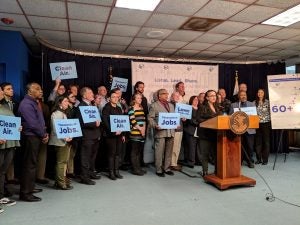 Jobs. Equity. Savings. Economic development. Social justice. These are a few of the terms being used to describe the ground-breaking Clean Energy Jobs Act, a new bill in Illinois which Environmental Defense Fund (EDF) played a key role in developing and supporting.
Jobs. Equity. Savings. Economic development. Social justice. These are a few of the terms being used to describe the ground-breaking Clean Energy Jobs Act, a new bill in Illinois which Environmental Defense Fund (EDF) played a key role in developing and supporting.
Introduced by the Illinois Clean Jobs Coalition and policymakers around the state, the Clean Energy Jobs Act (affectionately called CEJA or “see-juh”) has racked up almost 60 legislative sponsors in the weeks since its introduction.
Here are four reasons Illinois’ Clean Energy Jobs Act stands out as a nation-leading proposal.
1. It’s based on Illinois communities’ priorities.
On a 2018 “listening tour” throughout the state, EDF and our partners in the Illinois Clean Jobs Coalition had conversations with real people, talking about their concerns and desires for energy in Illinois. Again and again, we heard the same major priorities for Illinois citizens, which formed the basis of the four pillars of the Clean Energy Jobs Act:
- Jobs and economic opportunity, with an eye toward equity and social justice.
- 100% renewable energy by 2050.
- A carbon-free power sector by 2030.
- Cleaner transportation through electrification.
There is something for everyone in the bill: A plethora of business opportunities, for sectors ranging from transportation to tradespeople to entrepreneurs; energy bill savings for customers, especially those who spend a disproportionate share of their income on energy; and significantly less air pollution from fossil fuel power and transportation pollution.
New clean energy legislation in Illinois has customer and community needs at its core Click To Tweet2. There’s an unprecedented focus on creating economic opportunity in low-income and environmental justice communities.
Communities that are disproportionately impacted by pollution, burdened by rising energy bills outside of their control and facing a lack of sufficient job opportunities are often left out of the clean energy conversation.
The Future Energy Jobs Act of 2016 began to tackle those issues by providing low- or no-cost solar, energy efficiency upgrades and job training opportunities.
But throughout Illinois, people wanted – and needed – more. Building on the successes and lessons learned from the Future Energy Jobs Act, the Clean Energy Jobs Act creates a suite of new opportunities through:
- Clean Jobs Workforce Hubs, a network of frontline organizations that provide direct and sustained support for disadvantaged communities.
- Incubators for local businesspeople to develop clean energy businesses.
- Preferences for companies with equitable hiring practices and representation.
3. It will help transition coal communities to a clean energy future.
Using more clean energy typically means less coal-fired electricity.
The Clean Energy Jobs Act provides dedicated support for communities and workers affected by the closure of coal plants. Specifically, it creates Clean Energy Empowerment Zones, which provide funding and guidance for initiatives like new economic development and revitalizing unused coal plant sites.
With this type of flexible assistance, the Clean Energy Jobs Act enables communities to determine their own best path forward in the evolving energy landscape.
4. It will reform the energy market to create statewide savings.
The way electricity is currently purchased in Illinois means that unnecessary power is bought just in case. For most of the year, we are stuck paying for energy no one actually uses, which usually comes from dirtier sources like coal plants. Proposals at the federal level would exacerbate this problem by requiring states to pay more for dirtier, largely unused energy, or “capacity.”
The Clean Energy Jobs Act would give Illinois the power to take over all or a portion of its energy capacity market, allowing the state to reduce unnecessary electricity generation and choose cleaner, cheaper sources of electricity. The resulting savings would directly benefit customers via lower electric bills and could even provide funds for expanded development of renewable energy.
Illinois is already on its way to being a national leader in clean energy development. The legislature has until May 31 to consider the Clean Energy Jobs Act, so now is the time to turn the priorities of Illinois communities into reality. EDF and our partners in the Clean Energy Jobs Coalition will fight to get it done and deliver cleaner, smarter power and economic opportunity throughout the state.